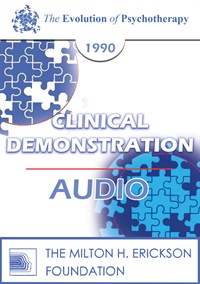
- Average Rating:
- Not yet rated
- Topic Areas:
- Clinical Presentations | Psychotherapy | Therapist Development | Treatment Planning
- Categories:
- Evolution of Psychotherapy | Evolution of Psychotherapy 1990
- Faculty:
- Joseph Wolpe, M.D.
- Duration:
- 52 Minutes
- Format:
- Audio Only
- Original Program Date:
- Dec 15, 1990
- Short Description:
- Educational Objectives: To learn the technique of behavioral data-gathering To understand how data is analyzed to reveal case dynamics and pointers to treatment
- Price:
- $15.00 - Base Price
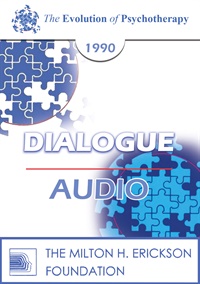
- Average Rating:
- Not yet rated
- Topic Areas:
- Dialogues | Goals of the Therapist | Psychotherapy | Therapist Development
- Categories:
- Evolution of Psychotherapy | Evolution of Psychotherapy 1990
- Faculty:
- Judd Marmor | Joseph Wolpe, M.D.
- Duration:
- 59 Minutes
- Format:
- Audio Only
- Original Program Date:
- Dec 14, 1990
- Short Description:
- Dialogue 05 from the Evolution of Psychotherapy 1990 - The Goals of Psychotherapy, featuring Judd Marmor, MD, PhD, and Thomas Szasz, MD. Moderated by Michael Yapko, PhD.
- Price:
- $15.00 - Base Price
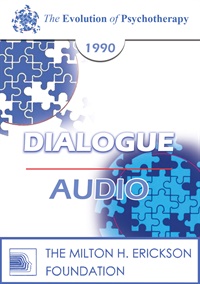
- Average Rating:
- Not yet rated
- Topic Areas:
- Dialogues | Psychotherapy | Research | Therapist Development
- Categories:
- Evolution of Psychotherapy | Evolution of Psychotherapy 1990
- Faculty:
- James Bugental, PhD | Mary Goulding, MSW
- Duration:
- 56 Minutes
- Format:
- Audio Only
- Original Program Date:
- Dec 14, 1990
- Short Description:
- Dialogue 07 from the Evolution of Psychotherapy 1990 - How Does Therapy Cure? featuring James FT Bugental, PhD, and Mary Goulding, MSW. Moderated by W Michael Munion, MA.
- Price:
- $15.00 - Base Price
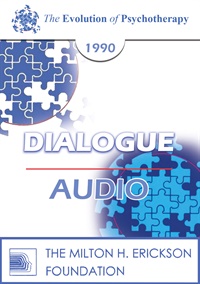
- Average Rating:
- Not yet rated
- Topic Areas:
- Dialogues | Personality Disorders | Psychotherapy | Therapist Development
- Categories:
- Evolution of Psychotherapy | Evolution of Psychotherapy 1990
- Faculty:
- James F. Masterson, MD | Donald Meichenbaum, PhD
- Duration:
- 58 Minutes
- Format:
- Audio Only
- Original Program Date:
- Dec 15, 1990
- Short Description:
- Dialogue 08 from the Evolution of Psychotherapy 1990 - Personality Disorders and Therapeutic Neutrality, featuring James Masterson, MD,and Donald Meichenbaum, PhD. Moderated by Joseph Barber, PhD.
- Price:
- $15.00 - Base Price
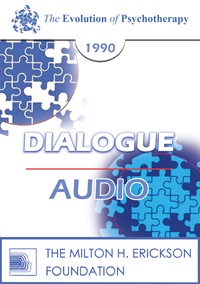
- Average Rating:
- Not yet rated
- Topic Areas:
- Dialogues | Psychotherapy | Therapist Development
- Categories:
- Evolution of Psychotherapy | Evolution of Psychotherapy 1990
- Faculty:
- Rollo May, PhD | Erving Polster, PhD
- Duration:
- 1 Hour 2 Minutes
- Format:
- Audio Only
- Original Program Date:
- Dec 15, 1990
- Short Description:
- Dialogue 09 from the Evolution of Psychotherapy - Growth Facilitation, featuring Rollo May, PhD, and Erving Polster, PhD. Moderated by Betty Alice Erickson-Elliott.
- Price:
- $15.00 - Base Price
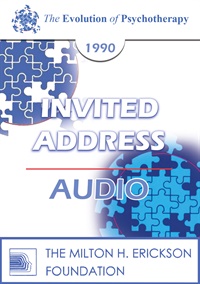
- Average Rating:
- Not yet rated
- Topic Areas:
- Invited Addresses | Panic | Psychotherapy | History of Psychotherapy | Therapist Development
- Categories:
- Evolution of Psychotherapy | Evolution of Psychotherapy 1990
- Faculty:
- Arnold Lazarus, Ph.D. | Jay Haley, MA
- Duration:
- 1 Hour 11 Minutes
- Format:
- Audio Only
- Original Program Date:
- Dec 13, 1990
- Short Description:
- Ten myths, some contradictory, some interconnected, are outlined, followed by a fairly detailed exposition and rebuttal. The treatment of a young man with panic disorder is discussed as an exemplar of the need to apply data-based treatments of choice within the context of clinical artistry. Technical eclecticism is defined and is offered as a possible solution to many common misconceptions.
- Price:
- $15.00 - Base Price
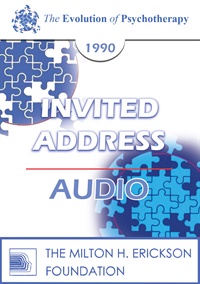
- Average Rating:
- Not yet rated
- Topic Areas:
- Invited Addresses | Ericksonian Hypnosis and Therapy Techniques | Psychotherapy | Treatment Planning | Therapist Development
- Categories:
- Evolution of Psychotherapy | Evolution of Psychotherapy 1990
- Faculty:
- Jeffrey Zeig, PhD | James F. Masterson, MD
- Duration:
- 1 Hour 15 Minutes
- Format:
- Audio Only
- Original Program Date:
- Dec 13, 1990
- Short Description:
- This paper surveys a key concept of Ericksonian therapy. Cornerstone principles of an Erickson ian approach are presented and illustrated. The method can be incorporated into any psychotherapeutic discipline in order to enhance effectiveness.
- Price:
- $15.00 - Base Price
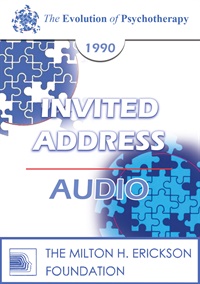
- Average Rating:
- Not yet rated
- Topic Areas:
- Invited Addresses | Psychotherapy | Therapist Development
- Categories:
- Evolution of Psychotherapy | Evolution of Psychotherapy 1990
- Faculty:
- Paul Watzlawick, PhD | Cloe Madanes, HDL, LIC
- Duration:
- 1 Hour 28 Minutes
- Format:
- Audio Only
- Original Program Date:
- Dec 14, 1990
- Short Description:
- The criterion of reality adaptation as a measure of mental health or pathology is a totally fictitious one, since what reality "really" is remains an arbitrary definition which, in turn, leads to a reification. However, out of these reifications can grow very important practical consequences - both positive and negative ones.
- Price:
- $15.00 - Base Price
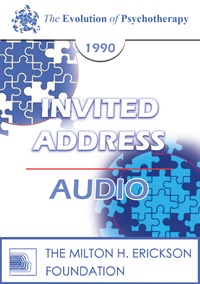
- Average Rating:
- Not yet rated
- Topic Areas:
- Invited Addresses | Depression | Psychotherapy | Therapist Development
- Categories:
- Evolution of Psychotherapy | Evolution of Psychotherapy 1990
- Faculty:
- Joseph Wolpe, M.D. | Thomas Szasz, MD
- Duration:
- 1:24:43
- Format:
- Audio Only
- Original Program Date:
- Dec 14, 1990
- Short Description:
- Accepted thinking about non-polar, non-psychotic depression has been impaired by ignoring crucial research. This shows that some cases are masked endogenous depression; others are anxiety-based in several ways. Therefore, each case must be investigated to decide appropriate treatment and thus surpass the mediocre results typified in the "Collaborative Study."
- Price:
- $15.00 - Base Price
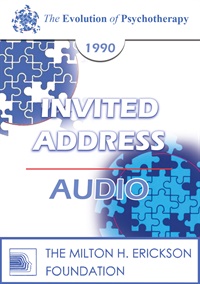
- Average Rating:
- Not yet rated
- Topic Areas:
- Invited Addresses | Couples Therapy | Sex and Sexuality | Interviewing | Therapist Development | Treatment Planning
- Categories:
- Evolution of Psychotherapy | Evolution of Psychotherapy 1990
- Faculty:
- Helen Singer Kaplan, MD, PhD | Joseph Wolpe, M.D.
- Duration:
- 1 Hour
- Format:
- Audio Only
- Original Program Date:
- Dec 15, 1990
- Short Description:
- The evaluation is the single most important clinical task of therapists who work with sexual problems. That is because accurate assessment is the key to successful treatment, and many unnecessary therapy failures can be traced to inadequate evaluation procedures and to the failure of the therapist to elicit pertinent information. Traditional psychological and psychiatric examinations, which emphasize the childhood roots of sexual problems are not adequate for evaluating sexual disorders. Dr. Kaplan will demonstrate her method of evaluation, which focuses on the patient's or couple's current sexual behavior and experience. This, together with historic information, provides the information required for understanding the dynamics of the dysfunction and for formulating a rational treatment plan.
- Price:
- $15.00 - Base Price
Please wait ...

